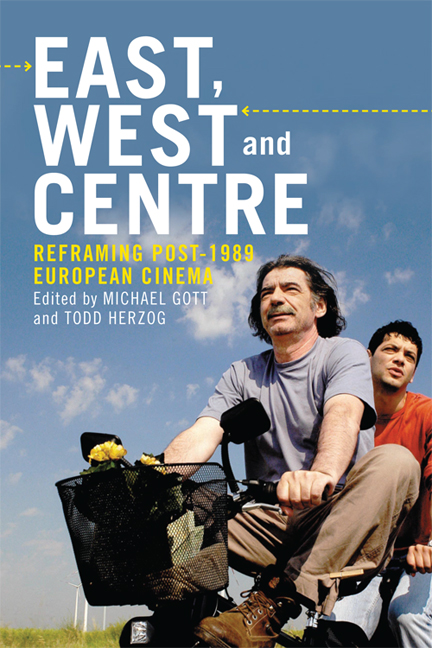Book contents
- Frontmatter
- Contents
- List of Figures
- Notes on Contributors
- Acknowledgements
- Introduction: East, West and Centre: ‘Mapping Post-1989 European Cinema’
- Part I Redrawing the Lines: De/Recentring Europe
- 1 The Berlin Wall Revisited: Reframing Historical Space between East and West in Cynthia Beatts's Cycling the Frame (1988), The Invisible Frame (2009) and Bartosz Konopka's Rabbit à la Berlin (2009)
- 2 Changing Sides: East/West Travesties in Lionel Baier's Comme des voleurs (à l'est)
- 3 Dubbing and Doubling Over: The Disorientation of France in the Films of Michael Haneke and Krzysztof Kieślowski
- 4 Challenging the East–West Divide in Ulrich Seidl's Import Export (2007)
- 5 Fatih Akın's Filmic Visions of a New Europe: Spatial and Aural Constructions of Europe in Im Juli/In July (2000
- 6 Salami Aleikum – The ‘Near East’ Meets the ‘Middle East’ in Europe
- 7 Cinematic Fairy Tales of Female Mobility in Post-Wall Europe: Hanna v. Mona
- Part II Border Spaces, Eastern Margins and Eastern Markets: Belonging and the Road to/from Europe
- Part III Spectres of the East
- Notes
- Bibliography
- Index
7 - Cinematic Fairy Tales of Female Mobility in Post-Wall Europe: Hanna v. Mona
from Part I - Redrawing the Lines: De/Recentring Europe
Published online by Cambridge University Press: 05 September 2016
- Frontmatter
- Contents
- List of Figures
- Notes on Contributors
- Acknowledgements
- Introduction: East, West and Centre: ‘Mapping Post-1989 European Cinema’
- Part I Redrawing the Lines: De/Recentring Europe
- 1 The Berlin Wall Revisited: Reframing Historical Space between East and West in Cynthia Beatts's Cycling the Frame (1988), The Invisible Frame (2009) and Bartosz Konopka's Rabbit à la Berlin (2009)
- 2 Changing Sides: East/West Travesties in Lionel Baier's Comme des voleurs (à l'est)
- 3 Dubbing and Doubling Over: The Disorientation of France in the Films of Michael Haneke and Krzysztof Kieślowski
- 4 Challenging the East–West Divide in Ulrich Seidl's Import Export (2007)
- 5 Fatih Akın's Filmic Visions of a New Europe: Spatial and Aural Constructions of Europe in Im Juli/In July (2000
- 6 Salami Aleikum – The ‘Near East’ Meets the ‘Middle East’ in Europe
- 7 Cinematic Fairy Tales of Female Mobility in Post-Wall Europe: Hanna v. Mona
- Part II Border Spaces, Eastern Margins and Eastern Markets: Belonging and the Road to/from Europe
- Part III Spectres of the East
- Notes
- Bibliography
- Index
Summary
In the ensuing narrative I bring together Szabolcs Hajdu's Bibliotheque Pascal (2010, Hungary/Germany/UK/Romania) and Joe Wright's Hanna (2011, UK/Germany/USA), two recent European films, directed by a Hungarian and a British director respectively, that foreground the act of female mobility and the perceived feminisation of European (and global) migration in divergent, yet complementary, ways. The pairing of these two cinematic texts is motivated by their strategic use of fantasy as both a narrative trope and a coping mechanism for their female protagonists. This fantastic element, I argue, points to the continued unease with regard to female mobility, as such, and the complications that arise in the process of representing that mobility. While both films employ elements of the fantastic (Wright's film incorporates the Brothers Grimm fairy tale ‘Snow White’, and Hajdu's film engages magic realism as a storytelling strategy), and unabashedly engage in romanticising and exoticising their protagonists, when considered together, they provide an accurate and quite realistic depiction of the bifurcated nature of transnational mobility in the unifying Europe. In telling ways, both films racialise the female on the move and frame her within the economy of loss. By doing so, the films perform what Ewa Mazierska and Laura Rascaroli define in their seminal study of the European road movie as the ‘traditional pejorative link between femininity and mobility’ (2006: 186). Ultimately, my analysis showcases how the pre-Wall divisions between the First and the Second Worlds and the historical inheritance of Nazism and Communism seem to linger on in the New Europe, determining the possibilities and potentialities of women on the move. These new inflections of the old divisions put in question the grand idea of the post-war European community as one that had been successfully reconstituted strictly in opposition to the violence precipitated by the Marxist and Fascist ideologies.
In his 1998 book Globalization: the Human Consequences, Zygmunt Bauman diagnoses the disconcerting bifurcation in the modes of global mobility when he identifies the split between those who travel today as ‘tourists’, and whose experience of mobility is desirable, and those who move with the stigma of being forever a ‘vagabond’, who move ‘because they have no other bearable choice’ (93).
- Type
- Chapter
- Information
- East, West and CentreReframing post-1989 European Cinema, pp. 109 - 124Publisher: Edinburgh University PressPrint publication year: 2014



